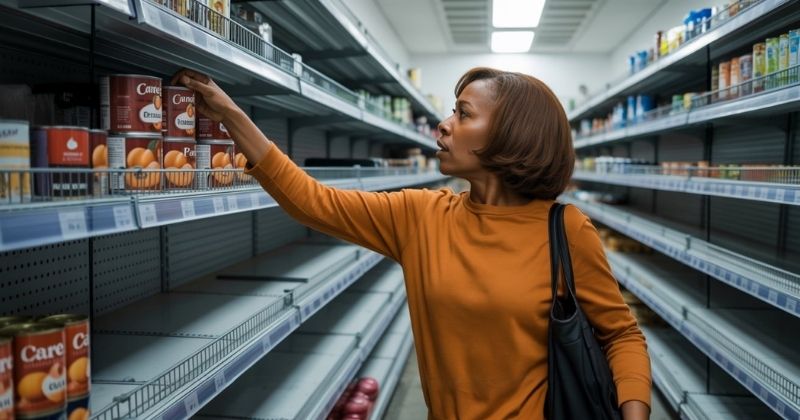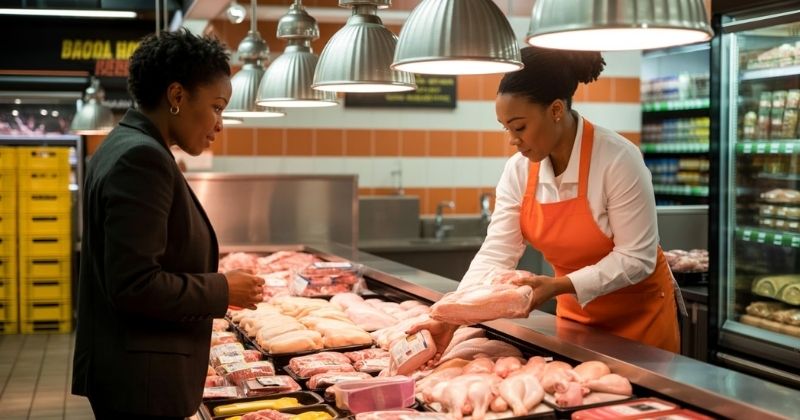
Hopes were briefly raised among South African meat producers when it appeared that the government would ease import restrictions on chicken from Brazil, potentially helping the country avoid a growing food supply crisis. However, those expectations have once again been shaken as trade discussions have failed to progress, leaving industry stakeholders concerned. Industry players are now scrambling to reassess production plans, stockpile remaining supplies, and anticipate a potential price war over scarce resources.
Key Takeaways
- MDM Supply Crisis Deepens: The ongoing impasse between Brazil and South Africa over import certification is preventing the shipment of mechanically deboned meat (MDM), a critical ingredient in affordable processed meats. Despite partial easing of import restrictions, no actual MDM has arrived in the country.
- Threat to Jobs and Food Security: With local MDM reserves nearly depleted, factories have gone idle and staff retrenchments have begun. The meat processing sector, which employs over 125,000 South Africans, is warning of escalating job losses and increased food insecurity.
- Wider Meat Industry Under Pressure: The MDM shortage is exacerbated by other blows to the sector, including a foot-and-mouth outbreak in beef production and the collapse of a major poultry producer. This combination is pushing meat prices higher and reducing access to affordable protein across the country.
About Arcadia Finance
Arcadia Finance makes getting a loan simple and stress-free. Pay no application fees and select from 19 fully NCR-compliant lenders. Experience a reliable, streamlined process tailored to your financial needs.
Negotiations Between South Africa and Brazil Reach a Standstill
The Department of Agriculture had initially communicated its decision to relax certain restrictions on Brazilian chicken imports, particularly those from regions unaffected by the avian influenza outbreak. However, efforts to resume the flow of mechanically deboned meat (MDM) into South Africa have stalled. Talks between the two countries have reached a deadlock, and the critical import of MDM remains blocked. This breakdown in talks is fuelling tensions within the meat sector, which depends heavily on consistent international supply chains to maintain output levels.
According to the South African Meat Processors Association (SAMPA), the two governments are unable to resolve a technical disagreement related to the wording of the import health certificate. As a result, the import ban first enforced in May 2025 continues to be applied in practice, despite partial regulatory adjustments. The dispute reportedly centres on sanitary phrasing that Brazil claims is misaligned with international trade standards, while South African authorities insist the language meets required disease-prevention protocols.
South Africa is already grappling with slowing growth and structural weaknesses that are putting pressure on households and businesses alike. As highlighted in South Africa’s economy faces serious challenges, persistent instability continues to affect employment, investment, and food security across the country.

Avian Flu Outbreak Prompted Original Import Ban
South Africa initially suspended chicken imports from Brazil in response to a confirmed outbreak of Highly Pathogenic Avian Influenza (HPAI), commonly referred to as avian flu. The ban, which took effect in May 2025, was implemented to prevent the spread of the virus through poultry products entering the country.
Although the measure was precautionary, it had immediate consequences across the processed meat industry, as Brazil accounted for a major share of imports.
Following criticism from industry stakeholders who highlighted the severe impact of the ban on local production, the Department of Agriculture agreed to partially lift restrictions. The decision allowed chicken imports from Brazilian provinces that were not affected by the flu outbreak, with the changes officially taking effect on 19 June. However, despite this policy shift, logistical bottlenecks and bureaucratic friction continue to stall any actual shipments.
Despite the Department’s announcement, the lack of agreement on the import certificate wording has meant that the resumption of Brazilian poultry imports has not occurred. Over a week has passed since the policy shift, and meat processors have reported that no new shipments have arrived. This delay has left local producers increasingly anxious as their existing MDM reserves are being depleted rapidly. Producers are warning that within weeks, shelves could start to show gaps in popular processed meat products unless swift action is taken.
Food shortages rarely occur in isolation. As outlined in Higher prices in South Africa and experts predict more to come, consumers are already facing mounting price increases, meaning even minor supply disruptions could translate into severe affordability challenges at supermarket level.
South Africa Lacks Local MDM Supply Capacity
The local production of MDM is minimal, which has forced South Africa to rely almost entirely on imports to meet demand. SAMPA explained that Brazil has long been the primary source of MDM for the country, accounting for approximately 95 percent of South Africa’s MDM imports over the past 12 years. Attempts to build local processing capacity have repeatedly stalled due to cost barriers, infrastructure shortfalls, and inconsistent demand.
Mechanically deboned meat is a key ingredient used in the manufacture of a variety of processed meat products such as polony, viennas, Russians, braai wors, bangers, frozen burgers, meat pies, and corned meat. These products are essential for many South Africans, particularly households in lower income brackets, as they offer one of the most affordable sources of protein.
A disruption in MDM supply therefore has a direct knock-on effect on basic nutrition and household food budgets across the country.
SAMPA, along with other meat producers including companies like Eskort, has reiterated warnings to the government regarding the broader implications of the continued MDM import block. They have cautioned that the combination of food supply shortages and rising meat prices could pose a threat to national food security and economic stability. Smaller meat processing businesses, already battling inflation and load shedding, face the risk of closure if their operations remain stalled.
With food availability and employment uncertainty affecting households, Higher Till Prices Add to Cost Pressures for South Africans provides important context on how price hikes are compounding existing economic stress. It connects everyday shopping costs to the wider financial landscape.

Meat Processing Industry Faces Job Cuts Amid Supply Crisis
The meat processing sector supports over 125,000 jobs across the country. SAMPA reported that the ongoing shortage of MDM has already led to a halt in operations for many of its members, with some manufacturers being forced to reduce staff due to production stoppages. Several processors have now been without fresh MDM stock for nearly two months, and even if shipments were dispatched immediately, they are unlikely to arrive before August. This delay could leave many factories inactive for up to three months.
The industry warns that extended downtime not only leads to job losses but may also result in permanent shutdowns if recovery proves too costly.
The shortage of MDM coincides with several other setbacks facing the local meat sector. South Africa’s largest beef feedlot recently reported an outbreak of foot-and-mouth disease, while the collapse of poultry producer DayBreak Foods has dealt a further blow to the poultry industry. Combined, these developments are expected to significantly limit the supply of affordable meat in the coming weeks.
Meat Prices Rising as Protein Stocks Dwindle
SAMPA has indicated that national stockpiles of affordable protein are critically low. This scarcity has already begun to affect retail prices, and further increases appear likely. According to recent Consumer Price Index data published by Statistics South Africa for the month of May, upward pressure on meat prices is already being recorded, largely attributed to the effects of the foot-and-mouth outbreak. Protein inflation may spill over into other food categories, as manufacturers seek alternative ingredients or shrink product sizes.
SAMPA has issued a renewed appeal to both the Brazilian and South African governments to resolve the current impasse as a matter of urgency. The association warned that continued inaction will lead to even sharper rises in food prices, more job losses in the processing sector, and further strain on businesses already operating under difficult conditions. Without resolution, the crisis could also impact retailers, school nutrition programmes, and low-income communities that depend on cheap meat products to meet daily dietary needs.
Conclusion
The continued disruption in MDM imports, compounded by disease outbreaks and structural failures within the local meat industry, presents a serious challenge to South Africa’s food supply chain. If not resolved swiftly, this crisis is likely to lead to more job losses, sharper food price increases, and greater hardship for lower-income households that rely on affordable protein to meet basic nutritional needs. The situation demands immediate cooperation between government authorities and trade partners to avoid long-term economic and social consequences.
Fast, uncomplicated, and trustworthy loan comparisons
At Arcadia Finance, you can compare loan offers from multiple lenders with no obligation and free of charge. Get a clear overview of your options and choose the best deal for you.
Fill out our form today to easily compare interest rates from 19 banks and find the right loan for you.


